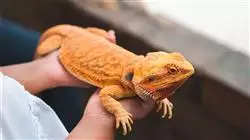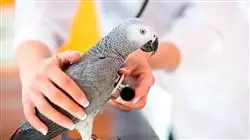University certificate
The world's largest faculty of veterinary medicine”
Introduction to the Program
Reptiles and Birds require specialized veterinarians. A profession increasingly in demand by owners who have chosen these animals as pets"

The Postgraduate Diploma in Reptiles and Birds is a high quality training program that focuses on the study of the main pathologies, diagnostic techniques and treatments in this type of animals to provide high level training to veterinarians who want to specialize in Reptiles and Birds.
Keeping wild birds or birds from breeding farms is a common fact nowadays that the veterinary professional must face in the daily clinical practice, for this reason it is necessary to understand the anatomical, physiological and ethological differences in conventional pets at home and between avian species in order to approach the patient correctly.
The management of the decompensated avian patient in the clinic needs to be fast and efficient, taking into account the appropriate instrumentation. In addition, its origin must be evaluated, either to consider it as a possible transmitter of zoonotic diseases, or to evaluate its possible reinsertion into the wild if it is a possible wild bird.
It is necessary to act with a simple care protocol that allows the veterinary professional to address the most common emergencies that may occur in the office and ensure their proper recovery withknowledge of supportive therapy applied to the avian patient.
For its part, the expansion of keeping reptiles as pets, mainly in developed countries, has resulted in the training of veterinary professionals in reptile care to an excellent level, comparable to that of veterinarians specializing in dogs and cats. In the rehabilitation centers for native and exotic fauna it is very important to acquire this knowledge, since it allows to assess the prognosis of each animal upon its arrival at the center.
There are about 6,500 species of reptiles, but few are kept in captivity. Even so, the clinical veterinarian must be qualified to receive and treat any species. The pets most commonly received in the daily clinic are iguanas, some species of lizards, turtles and snakes, which, although they are not domestic animals, should be considered non-conventional pets.
In addition, as it is an online diploma, the student is not constrained by fixed schedules or the need to move to another physical location, but can access the contents at any time of the day, balancing their work or personal life with their academic life as they wish.
Train with us and learn how to diagnose reptile and bird diseases to improve their quality of life"
The Postgraduate diploma in Reptiles and Birds contains the scientific most complete and up-to-date educational program on the market. The most important features of the program include:
- The development of case studies presented by experts in reptiles and birds
- The graphic, schematic, and eminently practical contents with which they are created provide scientific and practical information on the disciplines that are essential for professional practice
- The latest news on the diagnosis and treatment of diseases in reptiles and birds
- Practical exercises where the self-assessment process can be carried out to improve learning
- A special emphasis on innovative methodologies in the field of the diagnosis and treatment of diseases in reptiles and birds
- Theoretical lessons, questions to the expert, debate forums on controversial topics, and individual reflection assignments
- Content that is accessible from any fixed or portable device with an Internet connection
Do not miss the opportunity to do this Postgraduate Diploma in Reptiles and Birds with us. It's the perfect opportunity to advance your career"
It includes in its teaching staff, professionals belonging to the veterinary field, who pour into this training the experience of their work, in addition to recognized specialists from reference societies and prestigious universities.
The multimedia content, developed with the latest educational technology, will provide the professional with situated and contextual learning, i.e., a simulated environment that will provide immersive training programmed to train in real situations.
This program is designed around Problem Based Learning, whereby the specialist must try to solve the different professional practice situations that arise during the academic year. For this purpose, the professional will be assisted by an innovative interactive video system created by renowned and experienced experts in reptiles and birds.
Do not miss the opportunity to do this Postgraduate Diploma in Reptiles and Birds with us. It's the perfect opportunity to advance your career."

This training comes with the best didactic material, providing you with a contextual approach that will facilitate your learning."
Why study at TECH?
TECH is the world’s largest online university. With an impressive catalog of more than 14,000 university programs available in 11 languages, it is positioned as a leader in employability, with a 99% job placement rate. In addition, it relies on an enormous faculty of more than 6,000 professors of the highest international renown.

Study at the world's largest online university and guarantee your professional success. The future starts at TECH”
The world’s best online university according to FORBES
The prestigious Forbes magazine, specialized in business and finance, has highlighted TECH as “the world's best online university” This is what they have recently stated in an article in their digital edition in which they echo the success story of this institution, “thanks to the academic offer it provides, the selection of its teaching staff, and an innovative learning method aimed at educating the professionals of the future”
A revolutionary study method, a cutting-edge faculty and a practical focus: the key to TECH's success.
The most complete study plans on the university scene
TECH offers the most complete study plans on the university scene, with syllabuses that cover fundamental concepts and, at the same time, the main scientific advances in their specific scientific areas. In addition, these programs are continuously being updated to guarantee students the academic vanguard and the most in-demand professional skills. In this way, the university's qualifications provide its graduates with a significant advantage to propel their careers to success.
TECH offers the most comprehensive and intensive study plans on the current university scene.
A world-class teaching staff
TECH's teaching staff is made up of more than 6,000 professors with the highest international recognition. Professors, researchers and top executives of multinational companies, including Isaiah Covington, performance coach of the Boston Celtics; Magda Romanska, principal investigator at Harvard MetaLAB; Ignacio Wistumba, chairman of the department of translational molecular pathology at MD Anderson Cancer Center; and D.W. Pine, creative director of TIME magazine, among others.
Internationally renowned experts, specialized in different branches of Health, Technology, Communication and Business, form part of the TECH faculty.
A unique learning method
TECH is the first university to use Relearning in all its programs. It is the best online learning methodology, accredited with international teaching quality certifications, provided by prestigious educational agencies. In addition, this disruptive educational model is complemented with the “Case Method”, thereby setting up a unique online teaching strategy. Innovative teaching resources are also implemented, including detailed videos, infographics and interactive summaries.
TECH combines Relearning and the Case Method in all its university programs to guarantee excellent theoretical and practical learning, studying whenever and wherever you want.
The world's largest online university
TECH is the world’s largest online university. We are the largest educational institution, with the best and widest online educational catalog, one hundred percent online and covering the vast majority of areas of knowledge. We offer a large selection of our own degrees and accredited online undergraduate and postgraduate degrees. In total, more than 14,000 university degrees, in eleven different languages, make us the largest educational largest in the world.
TECH has the world's most extensive catalog of academic and official programs, available in more than 11 languages.
Google Premier Partner
The American technology giant has awarded TECH the Google Google Premier Partner badge. This award, which is only available to 3% of the world's companies, highlights the efficient, flexible and tailored experience that this university provides to students. The recognition as a Google Premier Partner not only accredits the maximum rigor, performance and investment in TECH's digital infrastructures, but also places this university as one of the world's leading technology companies.
Google has positioned TECH in the top 3% of the world's most important technology companies by awarding it its Google Premier Partner badge.
The official online university of the NBA
TECH is the official online university of the NBA. Thanks to our agreement with the biggest league in basketball, we offer our students exclusive university programs, as well as a wide variety of educational resources focused on the business of the league and other areas of the sports industry. Each program is made up of a uniquely designed syllabus and features exceptional guest hosts: professionals with a distinguished sports background who will offer their expertise on the most relevant topics.
TECH has been selected by the NBA, the world's top basketball league, as its official online university.
The top-rated university by its students
Students have positioned TECH as the world's top-rated university on the main review websites, with a highest rating of 4.9 out of 5, obtained from more than 1,000 reviews. These results consolidate TECH as the benchmark university institution at an international level, reflecting the excellence and positive impact of its educational model.” reflecting the excellence and positive impact of its educational model.”
TECH is the world’s top-rated university by its students.
Leaders in employability
TECH has managed to become the leading university in employability. 99% of its students obtain jobs in the academic field they have studied, within one year of completing any of the university's programs. A similar number achieve immediate career enhancement. All this thanks to a study methodology that bases its effectiveness on the acquisition of practical skills, which are absolutely necessary for professional development.
99% of TECH graduates find a job within a year of completing their studies.
Postgraduate Diploma in Reptiles and Birds
.
Both the taxonomy and the epidemiological casuistry of the conditions that birds and reptiles can suffer from make them two complex species to manage from the veterinary point of view. Despite the fact that until a few decades ago the information related to the care of these animals was illusory, continuous research has determined guidelines and protocols for increasingly specific and effective action. For this reason, the specialist in this field needs programs such as the one TECH offers in order to keep up to date with the clinical advances in this area: its relevant aspects, the criteria to be taken into account and the advice to guarantee better results. In this way, you will be able to perfect your skills in reptile and avian veterinary care 100% online. TECH is proud to present the Postgraduate Diploma in Reptiles and Birds. This academic program is designed so that students interested in the biology and conservation of these species can learn about their taxonomy, anatomy, behavior and the ecosystems they inhabit. In addition, it provides comprehensive training on the proper management of these animals, either in captivity or in the wild.
Study with the best professionals of TECH Global University online
.
The professionals in charge of teaching this specialization have extensive experience in the research and management of reptiles and birds. One of the main objectives of the Postgraduate Diploma in Reptiles and Birds is to promote education on the importance of conservation of these animal species in order to encourage responsibility and respect for biodiversity and the environment. All classes are taught online, so that students can manage their time as they wish. In short, the Postgraduate Diploma in Reptiles and Birds is a unique opportunity for students interested in the biology and conservation of these animal species. A rigorous and comprehensive academic program that will provide them with skills and knowledge necessary to better understand these species and contribute to the conservation of biodiversity.







